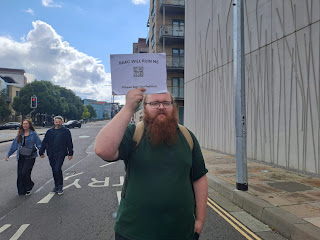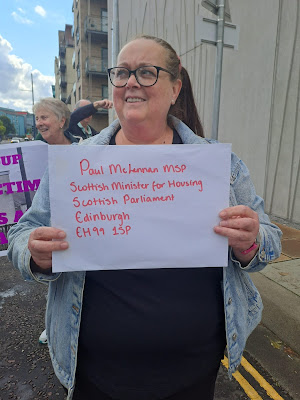PLEASE JOIN OUR 'UK RAAC CAMPAIGN GROUP' FB PAGE
A copy of the open letter below has been emailed to the Prime Minister via his online portal and parliamentary email, as well as to Angela Rayner via her official ministerial and parliamentary email. It has also been sent to the Scottish First Minister and Housing Minister by email. Additionally, a copy will be hand-delivered to the Scottish Parliament next week and to 10 Downing Street.
Dear Prime Minister Keir Starmer MP,
First Minister John Swinney MSP,
Secretary of State for Housing, Communities, and Local Government Angela Rayner
MP,
Minister for Housing Paul McLennan MSP,
Open Letter: Urgent request for
assistance with RAAC-Homes Crises
This letter has been sent by
email. Please reply in kind.
I am writing to you at a time when
1,994 homeowners in Scotland are facing financial crises and the imminent risk
of roof collapse. These homeowners either purchased their homes from local
councils or acquired ex-council houses from the private market. Unfortunately,
they were not informed at the point of sale that the roofs of these houses,
built around 1965, were constructed using Reinforced Autoclaved Aerated
Concrete (RAAC).
I am Wilson Chowdhry, Chairman of
the UK RAAC Campaign Group. I hope to share my thoughts on this matter with you
in the hope of garnering support and acceptance for the contents of the
petition I have submitted, which is accessible via this hyperlink. I have been
working on this issue for some time, prompted by the experience of my daughter,
Hannah Chowdhry, a law student at Aberdeen. She bought her first home at 19,
only to discover four months later that the roof, constructed with RAAC around
1965, was at risk of collapse. She never benefited from a council home discount
and now faces financial ruin unless the Scottish and UK Governments intervene.
I will explain below why I believe it will take a solution from both
Governments.
I am not going to delve into the
history of the RAAC issue, but for clarity, I am seeking your assistance for
the thousands of affected people I now represent. Desperate homeowners are
clinging to the belief that the UK and Scottish Governments will do the right
thing and provide much-needed support, preventing hard-working citizens who
struggled to pay mortgages from facing the prospect of homelessness. Many of
these homeowners, if not a large majority, are elderly and cannot restart their
lives at this stage. Every one of these homeowners deserves better treatment
from the governments to which they have diligently paid taxes and from councils
that have benefited from their regular council tax payments.
These properties were sold to
unsuspecting homeowners under the Right to Buy Scheme, presented as equitable
housing, a buffer against rising rents, and an investment that could create a
legacy for future generations—none of which has been achieved.
Even now, the UK Government's Right
to Buy summary booklet states:
“What are the benefits
and risks?
Owning a home can be a
good investment for the future, and gives you more freedom to make your home
your own. But make sure you’ve also considered the risks and responsibilities.”
I cannot imagine that, until this
RAAC crisis, the risks the scheme asked people to consider included the
possibility that RAAC in their roofs could one day collapse, endangering lives
or placing them in such a financial predicament. Moreover, without reviewing
the original materials provided at the time of each sale, it is difficult to
confirm whether warnings about the risks related to RAAC were given to everyone
who purchased a property – though I very much doubt this. The booklet also
states:
“Home ownership provides
a special sense of pride. It would give you more freedom to make the changes
you want to your home, and to move when and where you want to – for example, to
take up a new job in another area, or take the next step up the property
ladder.”
I would like to bring to the attention of the UK and
Scottish Governments that the majority of residents in these areas cannot
afford the inspections and remedial works that the Scottish Government has
stated are "matters for the building owner." This was communicated in
a letter to MSP Ariane Burgess, the Convener for Local Government Housing and Planning Committee , from Shirley-Anne
Somerville, Scotland’s Social Justice Secretary. On 8th September 2023, MP
Andrew Stuart responded to a question from MP Juliet Elliot by stating:
“Individual building owners and managers are responsible for health and safety,
including responding to safety alerts such as RAAC.” Admittedly, this question
concerned the prevalence of RAAC in privately-owned sporting facilities, but
the assertion remains the same.
When these homes were sold to deprived communities, they
were intended to provide equitable housing, and the estates with RAAC are
predominantly located in areas featured in indices of deprivation. Unless
support is provided to homeowners already struggling with a cost-of-living
crisis, they face an uncertain and bleak future. It is disappointing to read in
the same letter that the Scottish Government "cannot simply reallocate
money to issues such as RAAC," especially when any reallocation would obviously
need to be carefully considered and planned.
Whenever
a discussion on a national budget arises (my daughter Hannah Chowdhry first
called for this), each government denies responsibility or claims poverty. The
former Scottish Secretary of State, Alister Jack, stated that Scotland had
received record funding and that devolution meant the Scottish Government had
sole responsibility for housing under existing agreements. The Scottish
Government argues that their budgets had not been inflation-proofed, resulting
in a deficit of 9%. They counter-claim that these houses were built and many
sold before the formation of the Scottish Government (then Scottish Executive)
in 1999. Consequently, the Scottish Government is providing no financial
assistance to local councils, which are struggling to reprioritize existing
funds. Furthermore, they are offering inadequate compensation to homeowners
where demolition is the chosen course of action and have not yet made solid
offers of assistance to homeowners facing repair costs of up to £71,000 in
Aberdeen, for example.
Equally concerning is the fact
mentioned in MSP Somerville's letter that the Scottish Cross Sector Working
Group (CSWG) has discussed issues such as the use of dangerous building powers
under the Building (Scotland) Act 2003 for RAAC, as well as RAAC replacement
and management. This research aims to ensure that councils are equipped not
only to effectively condemn buildings owned by homeowners and private
businesses containing RAAC but also to prevent failures like those experienced
by residents in Deans South. In Deans South, residents had to fight to keep
their properties through a public inquiry and were eventually given a
"home for a home" by a developer who needed the land for their
project. However, 76 homeowners received meager compensation, with some being
offered as little as £18,000 for properties worth around £120,000. This
highlights the need for robust policies to ensure fair treatment and adequate
compensation for homeowners affected by RAAC-related issues, especially those
whose equity has plummeted to zero following council declarations of RAAC
presence.
In the same letter to the Convener
of COSLA, MSP Shirley-Anne Somerville wrote: “In responding to the
Committee’s request for an update on buying out homeowners living in ex-local
authority or housing association homes containing RAAC, as the Committee is
aware, the Capital Budget is under considerable strain and remains overcommitted
in this and future years. There are no available resources to allocate towards
a national fund at this time, and establishing one would necessitate further
reprioritization.”
I would like to suggest that there
can be no greater reprioritization than the imperative to keep people in their
homes. Several Scottish councils have declared a housing emergency, which will
worsen as they contemplate decisions regarding the relocation and demolition of
privately owned RAAC-affected properties, alongside council homes.
You don't need me to remind you
that these homes were purchased with the blood, sweat, and tears of
hard-working people, many of whom dedicated long hours and invested their life
savings and inheritances into homes they hoped would allow them to live rent-free
in their elderly years and provide an inheritance for their children. Now, many
of these residents are too old to start anew, and others, like my daughter,
face the burden of debt at a young age through no fault of their own.
This brings me to the main point of
my letter.
I strongly believe there is a moral
obligation for the UK and Scottish Government to assist homeowners facing
crippling financial crises and the threat of roof collapse due to RAAC. These
homeowners have diligently paid their council taxes and yet excluded themselves
from access to housing support while residing in these homes. Therefore, I urge
serious consideration for reprioritizing funds to establish a national budget
aimed at supporting RAAC-affected communities across Scotland, encompassing
both private and council tenants, in addition to homeowners.
The UK Government imposed the Right
to Buy (RTB) scheme on the Scottish Government, as we have been informed, thus
I believe it holds a moral responsibility to assist in resolving the current
crisis. The Scottish Government freed itself from RTB in July 2016 following
the Scottish Parliament’s Housing (Scotland) Act 2014. Numerous news stories
highlight the Scottish Government's historical reluctance toward the scheme.
Moreover, the principle of Estoppel
in English law, analogous to Scotland's law of personal bar, could potentially
be invoked in a legal challenge if the UK Government declines to offer support.
This legal doctrine protects legitimate expectations, and it could be argued
that homes sold under the UK Government’s Right to Buy (RTB) scheme failed to
fulfill the esteemed principles of being fit for purpose, intended as a legacy
for future generations, and promoting housing stability and equitable living conditions.
These principles are rooted in the Housing Act 1980 and the manner in which the
Right to Buy scheme was originally presented.
I cannot understand why the
previous UK Government offered no support for this RAAC-homes crisis. Although,
it appears that only Basildon Borough Council in England and the town of
Hirwaun in Wales, where RAAC homes were test cases, did not lead to wider
RAAC-built housing projects. The limited number of affected people in England
and Wales seems to have created reluctance to provide assistance. Moreover,
there appears to have been less stringent adherence to HM Treasury and Property
Services Agency construction procurement guidance for homes by Scottish
councils. This is evident from the extensive use of RAAC by Scottish local
authorities in council homes compared to the rest of the UK. Online
publications indicate a significant shift in procurement practices around 2018,
post-devolution. However, this does not absolve the Scottish Government from
responsibility to the people they serve, especially considering they were
responsible for implementing the Right to Buy scheme in Scotland, whether under
duress or willingly.
The politics of assigning blame
only serves to further burden families and individuals already grappling with a
severe cost-of-living crisis. It is crucial that both governments collaborate
swiftly and effectively to address the RAAC issue and provide the necessary
support to prevent further hardship and uncertainty among affected communities.
With that in mind, I urge the UK Government to consider co-funding a national
budget in collaboration with the Scottish Government, as I have previously
advocated.
On Sunday, 7th July, Prime Minister
Keir Starmer declared he would 'deliver for Scotland' while visiting First
Minister John Swinney in Edinburgh. Now, I read on the Delivering for Scotland
government website: "The UK Government is building a fairer, safer, and
more prosperous country that works for everyone." I hope you will
deliver on that promise, as it will ultimately be the citizens of Scotland who
bear the brunt of any neglect. Surely, this outcome cannot be tolerated by your
government, and I trust you share this concern.
This budget should ensure that
homeowners receive necessary financial support for inspections and, where
applicable, fair compensation through voluntary purchase offers or Compulsory
Purchase Orders issued by local councils. With seven councils in Scotland
already declaring a housing emergency, this number is likely to rise if RAAC
homeowners are added to the existing homelessness crisis. I have spoken with
Clackmannanshire Council and am aware of the innovative measures local councils
have had to take to support homeowners and tenants affected by RAAC. For
instance, they have sought funds from regeneration budgets for voluntary
purchases. Similarly, Aberdeen City Council has reprioritized funds initially
intended for Ukrainian refugees to address the RAAC crisis in their city,
although this support has not yet extended to homeowners.
Implementing a national budget
would alleviate the reluctance towards assistance seen in the 13 councils and
social landlords grappling with the RAAC homeowner crisis. It would provide a
unified approach and necessary resources to ensure consistent support across
all affected areas, benefiting both homeowners and tenants alike.
Additionally, we are advocating for a public inquiry into the
practices of councils and housing associations concerning RAAC. This inquiry
should thoroughly investigate how these entities conducted business related to
RAAC, including historical practices, the handling of property sales,
disclosure of RAAC presence, and their response to homeowner concerns. It is
essential that this inquiry ensures transparency, identifies any shortcomings
in procedures, and holds accountable those responsible for ensuring housing
safety and integrity.
We also propose legislation aimed at safeguarding future
homebuyers from encountering similar issues. The proposed law would establish a
comprehensive register of high-risk buildings across Scotland, providing
essential transparency and protection. This register would ensure that
solicitors and RCIS certified surveyors share joint responsibility in property
transactions, ensuring thorough reporting on critical issues such as RAAC and
cladding to prospective homeowners. Given that RAAC is not as visibly identifiable
as cladding, surveyors would play a crucial role in identifying potential risks
during inspections, including those associated with asbestos-containing
artexing. Conveyancing solicitors would then verify these risks against the
register to determine their relevance. Should either party fail in their duty,
affected buyers would have the right to seek legal recourse to recover their
losses.
We also advocate
for the introduction of legislation similar to the General Product Safety
Regulations (GPSR), which mandates manufacturers to address safety defects for
the lifetime of a vehicle, to be applied to the housing industry. This measure
would hold developers accountable for rectifying safety issues such as cladding
and RAAC in homes they built, even after purchase. It would ensure that
developers who profited from constructing these homes are responsible for
necessary repairs during future crises involving situations like those with
cladding and RAAC.
We advocate for an amendment to existing financial legislation, such as the Financial Services and Markets Act 2000, to include provisions for protecting homeowners whose properties are condemned and demolished from the burden of paying off their mortgages. This could involve mortgage interest rate relief or other financial protections. After all, the UK Government has previously bailed out the banks with taxpayer money, and it seems only fair that they accept this small loss to support affected homeowners.
Finally, we call for a legislative amendment to the Finance Act 2003 to be passed by the UK Parliament. We hope this amendment can be supported through a Private Member’s Bill or included in broader financial legislation. This change would renew the first-time buyer status for homeowners affected by RAAC or similar crises.
We would appreciate it if any decisions made regarding this request for RAAC homeowners include all affected homeowners across the UK.
A copy of our petition can be read
below though we have also applied for a Citizen
Participation & Public Petition on the Scottish Government website.
https://www.ipetitions.com/petition/concrete-solutions-for-raac-problem
I eagerly await your response to
this letter.
Best regards,
Wilson
Chowdhry
Chairman, UK RAAC Campaign Group
wilson@aasecurity.co.uk



















